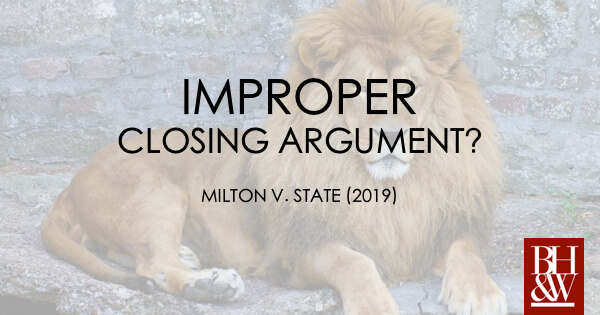
When Does a Closing Argument Go Too Far?
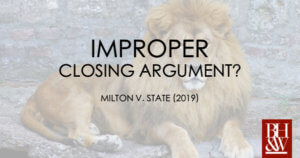 What do Atticus Finch, Lt. Daniel Kaffee, and Jake Brigance have in common? Each of these fictional movie attorneys are known for zealously representing their clients by delivering intense cross examinations and galvanizing closing arguments. Finch, defending a wrongly-accused man in a time a place where justice was compromised by racial bias, implored the jury to seek justice by tapping into a higher power, “In the name of God do your duty.” Stuck at the crossroads of respecting formal rank and seeking justice in a military court-martial, Lt. Kaffee made the choice to double down on Col. Jessep during cross examination, poking at the Colonel’s pride. Col. Jessep took Lt. Kaffee’s bait, screaming, “You can’t handle the truth!” Jake Brigance took a more creative approach. Asking jurors to close their eyes, Brigance described a depraved series of events that caused his client to murder two people. The jury agreed with the justification, and acquitted Brigance’s client.
What do Atticus Finch, Lt. Daniel Kaffee, and Jake Brigance have in common? Each of these fictional movie attorneys are known for zealously representing their clients by delivering intense cross examinations and galvanizing closing arguments. Finch, defending a wrongly-accused man in a time a place where justice was compromised by racial bias, implored the jury to seek justice by tapping into a higher power, “In the name of God do your duty.” Stuck at the crossroads of respecting formal rank and seeking justice in a military court-martial, Lt. Kaffee made the choice to double down on Col. Jessep during cross examination, poking at the Colonel’s pride. Col. Jessep took Lt. Kaffee’s bait, screaming, “You can’t handle the truth!” Jake Brigance took a more creative approach. Asking jurors to close their eyes, Brigance described a depraved series of events that caused his client to murder two people. The jury agreed with the justification, and acquitted Brigance’s client.
Under the Texas Disciplinary Rules of Professional Conduct, an attorney must render competent and diligent representation to their clients, “and with zeal in advocacy upon the client’s behalf.” “1.01 Competent and Diligent Representation,” www.legalethicstexas.com, accessed April 6, 2019. Where is the line drawn for zealous representation in a closing argument? Can demonstrative evidence used in a closing argument go too far? The Court of Criminal Appeals of Texas (“CCA”) says it can.
Milton v State (Tex. Crim. App. 2019) | Improper Closing Argument?
In 2015, Damon Milton robbed a drug store by asking a cashier to give him the money from the cash register. Milton never showed a weapon, and he pretended to shop until customers were not around. He always kept his hands out and visible. According to the police report, Milton did not have a weapon. Additionally, there was some circumstantial evidence that Milton had committed the same robbery to the same drug store the day before. At trial, Milton was found guilty of robbery.
During the sentencing phase of the trial, the State entered into evidence and played before the jury a 35-second video of a baby dressed in zebra-striped clothing at a zoo sitting in front of a protective glass enclosure. Behind the glass was a lion, ferociously trying to get to the baby. The State argued that Milton deserved a long sentence because of his criminal background and because of the crime. Additionally, the State entered into evidence Milton’s criminal history which included forgery, attempted unauthorized use of a motorized vehicle, and robbery by threat.
Defense for Milton objected to the video, on the grounds of relevance and prejudice. Moreover, “there [was] no indication that any of his past convictions involved crimes that were particularly brutal or gruesome…[nor]…any indication that…[there were any] crimes against children.” The State responded that the video illustrated that “motive plus opportunity equals behavior.” In other words, that getting away with a light sentence could embolden Milton to commit future crimes; or that if Milton would be locked away in prison, then he would not be able to commit a future crime, as imprisonment “removes the opportunity.”
Further, the State described the video to the jury, “the motive of that lion is never-changing, never changing, it’s innate…with the glass, the scene is funny, without the glass, a tragedy.” The State added, “we know that the [defendant] is such a bad guy…it’s almost laughable, just like that lion…nothing funny when the [defendant] is outside of prison, that’s a tragedy…[he] is never changing his motive.” The jury assessed Milton’s punishment at 50 years. Milton appealed to the court of appeals, arguing that the trial court’s allowing the video was an abuse of its discretion. On appeal, the State argued that the video was an impassioned plea for law enforcement and community protection, saying it was acceptable to argue that the defendant was a “vicious lion trying to eat a baby and the court needed to stop him.” The court of appeals upheld the trial courts holding, though the court noted that the State’s analysis was “tenuous.” Milton appealed to the CCA.
CCA Holds that Closing Arguments Should Not Inflame a Jury with Things Not Before Them
The CCA had to determine whether the demonstrative video shown at the sentencing phase of the trial was out of step. “The purpose of a closing argument is to facilitate the jury in properly analyzing the evidence presented…so that it may arrive at a just and reasonable conclusion based on the evidence alone, and not on any fact not admitted into evidence.” Campbell v. State, 610 S.W.2d 754, 756 (Tex. Crim. App. 1980). “It should not arouse the passion or prejudice of the jury by matters not properly before them.” Id. “Arguments that go beyond summation of the evidence, reasonable deduction from the evidence, answer to arguments made by opposing counsel, or law enforcement please, too often place before the jury unsworn…testimony of the attorney.” Alejandro v. State, 493 S.W.2d 230, 231 (Tex. Crim. App. 1973). Even though jurors are not stupid, they are human, which is why courts prohibit highly prejudicial evidence.
Accordingly, the CCA concluded that the video could be considered unfairly prejudicial “because it encouraged the jury to make its decision upon matters outside of the record by inviting a comparison between [Milton] and hungry lion.” “The State may strike hard blows, but it must not strike foul ones.” Jordan v. State, 646 S.W.2d 946 (Tex. Crim. App. 1983). There are limits to demonstrative aids in closing arguments. The CCA reversed the court of appeals opinion and remanded to the appeals court for a harm analysis.

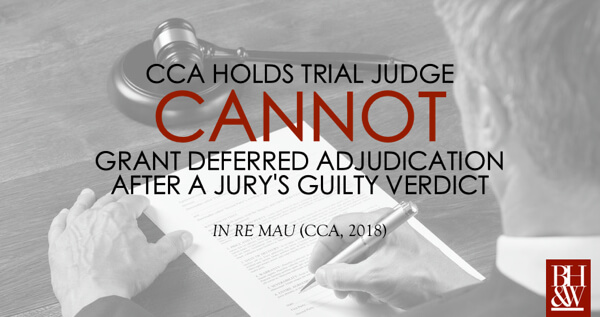
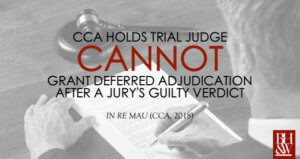 The Court of Criminal Appeals recently handed down an opinion on a petition for writ of mandamus. The two issues facing the court were (1) the nature of a misdemeanor trial after a defendant pleads guilty to a jury; and, (2) whether a trial court has the ability to defer an adjudication of guilt after a jury finds a defendant guilty. The Court of Criminal Appeals declined to grant mandamus relief on the first issue but, for the reasons discussed below, it granted mandamus relief for the second issue.
The Court of Criminal Appeals recently handed down an opinion on a petition for writ of mandamus. The two issues facing the court were (1) the nature of a misdemeanor trial after a defendant pleads guilty to a jury; and, (2) whether a trial court has the ability to defer an adjudication of guilt after a jury finds a defendant guilty. The Court of Criminal Appeals declined to grant mandamus relief on the first issue but, for the reasons discussed below, it granted mandamus relief for the second issue.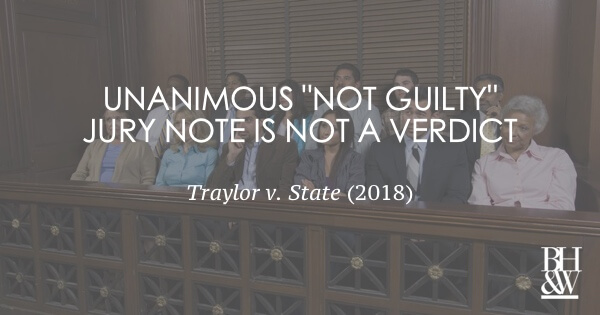
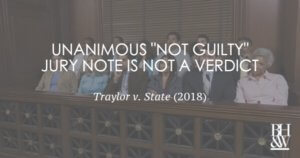 The Court of Criminal Appeals recently handed down an opinion regarding whether a jury can informally acquit based on a unanimous jury note. The issue facing the court was whether a jury note, which provided the jury’s voting breakdown of the charged offense and the lesser included offense, could be considered an acquittal for double jeopardy purposes even though a mistrial was later declared because the jury could not reach a unanimous decision.
The Court of Criminal Appeals recently handed down an opinion regarding whether a jury can informally acquit based on a unanimous jury note. The issue facing the court was whether a jury note, which provided the jury’s voting breakdown of the charged offense and the lesser included offense, could be considered an acquittal for double jeopardy purposes even though a mistrial was later declared because the jury could not reach a unanimous decision.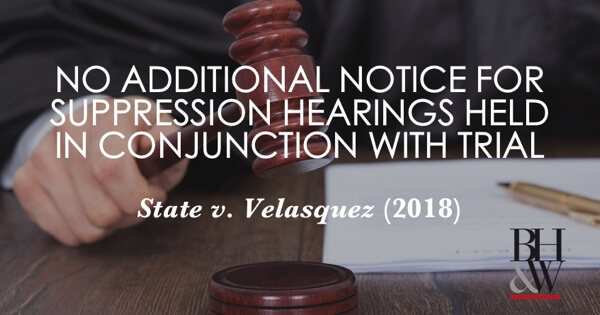
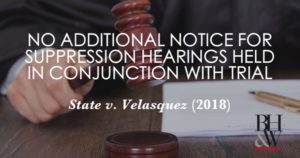
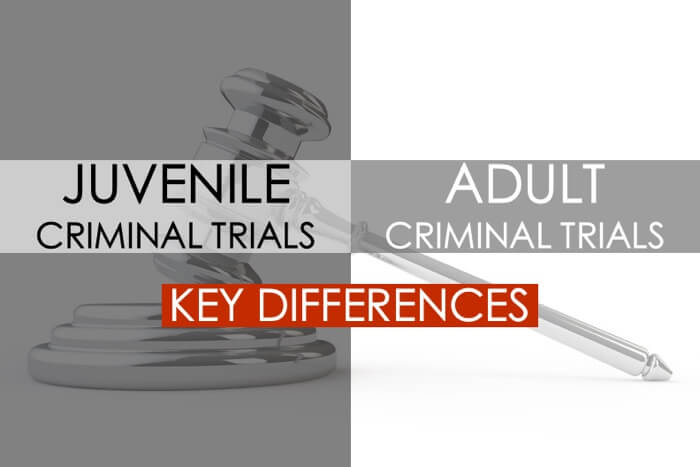
 The juvenile justice system is a hybrid system. Juvenile proceedings are technically civil in nature, but they incorporate many elements from the criminal system. The reason for this separate system is to teach children that they will be held responsible for their actions without labeling them as criminals. The differences between adult and juvenile trials is a direct result of this difference in systems.
The juvenile justice system is a hybrid system. Juvenile proceedings are technically civil in nature, but they incorporate many elements from the criminal system. The reason for this separate system is to teach children that they will be held responsible for their actions without labeling them as criminals. The differences between adult and juvenile trials is a direct result of this difference in systems.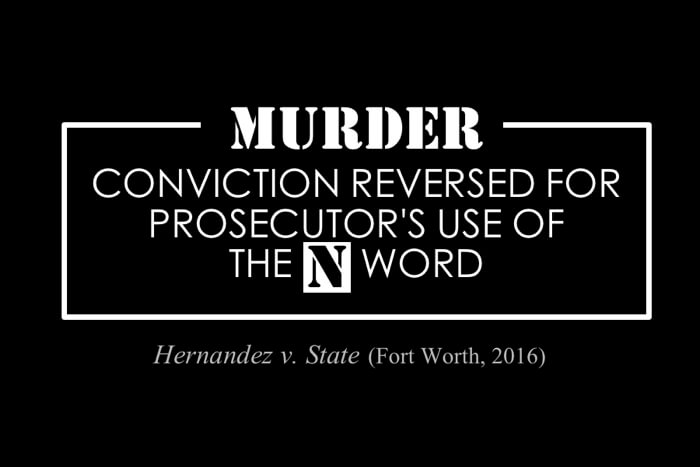
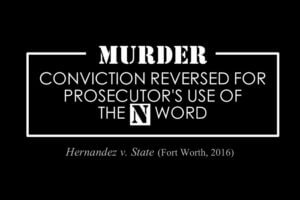 In December of 2014, Appellant Luis Miguel Hernandez was convicted of the murder of Devin Toler, an African-American man. During the trial, Appellant claimed self-defense, arguing that Toler attacked him and that by killing him, he was defending himself from the attack. The prosecution, however, presented evidence that Appellant provoked Toler by his words, some of them racial slurs. The actual words of the alleged racial slurs were never presented to the jury in the testimony of any witness or otherwise. However, during closing argument, the prosecutor said the following:
In December of 2014, Appellant Luis Miguel Hernandez was convicted of the murder of Devin Toler, an African-American man. During the trial, Appellant claimed self-defense, arguing that Toler attacked him and that by killing him, he was defending himself from the attack. The prosecution, however, presented evidence that Appellant provoked Toler by his words, some of them racial slurs. The actual words of the alleged racial slurs were never presented to the jury in the testimony of any witness or otherwise. However, during closing argument, the prosecutor said the following: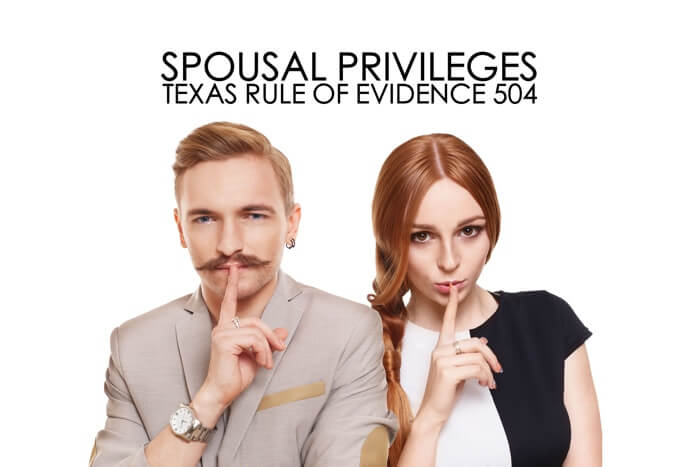
 Everyone knows (or should know) of the attorney-client privilege which prohibits the calling of an attorney to testify as a witness against his client and protects the attorney-client relationship. But what about the husband-wife relationship? Are spouses afforded any protection from having their spouse testify against them in a criminal trial?
Everyone knows (or should know) of the attorney-client privilege which prohibits the calling of an attorney to testify as a witness against his client and protects the attorney-client relationship. But what about the husband-wife relationship? Are spouses afforded any protection from having their spouse testify against them in a criminal trial?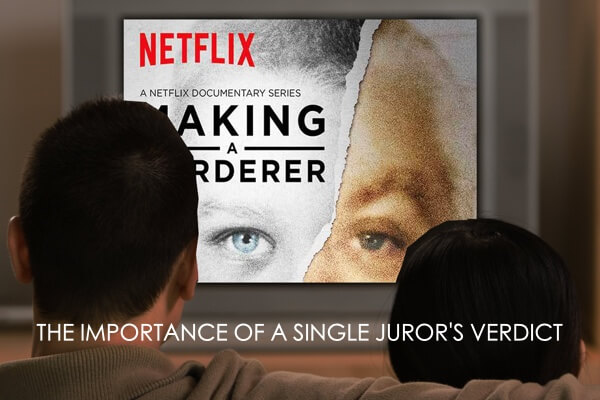
 We, like many of you, have been sucked into the sad, frustrating, and very real tale of the murder trial of Steven Avery in Manitowoc County, Wisconsin brought forth in the
We, like many of you, have been sucked into the sad, frustrating, and very real tale of the murder trial of Steven Avery in Manitowoc County, Wisconsin brought forth in the 
 In 2011, I had the privilege of escorting the late Mr. Vincent Bugliosi around Marine Corps Base Camp Pendleton, as he was the guest speaker at a trial advocacy conference my office organized. Mr. Bugliosi, 76 years old, was best known as the prosecutor that put Charles Manson away. He was also a renowned true crime author, writing such books as Helter Skelter, And the Sea Will Tell, ‘Till Death Us Do Part, and Outrage. He would tell you, however, that his proudest moment was his victory over Gerry Spence in the mock trial of Lee Harvey Oswald for the assassination of President John F. Kennedy. Other than this mock trial, Gerry Spence boasts a perfect trial record.
In 2011, I had the privilege of escorting the late Mr. Vincent Bugliosi around Marine Corps Base Camp Pendleton, as he was the guest speaker at a trial advocacy conference my office organized. Mr. Bugliosi, 76 years old, was best known as the prosecutor that put Charles Manson away. He was also a renowned true crime author, writing such books as Helter Skelter, And the Sea Will Tell, ‘Till Death Us Do Part, and Outrage. He would tell you, however, that his proudest moment was his victory over Gerry Spence in the mock trial of Lee Harvey Oswald for the assassination of President John F. Kennedy. Other than this mock trial, Gerry Spence boasts a perfect trial record.





